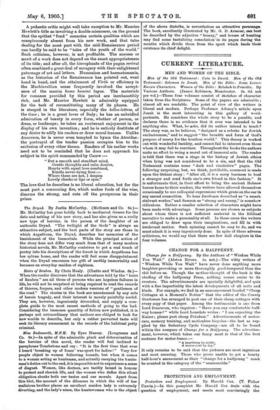C URRENT LITERAT (IRE.
Men of the Old Testament : Cain to David. Men of the Old Testament : Solomon to Jonah. Men of the Bible : Some Lesser- Known Characters. Women of the Bible: Rebekah to Priscilla. By Various Authors. (James Robinson, Manchester. 3s. (id. net per vol.)—These four volumes consist of sketches of character taken from the Scriptures. Some of the papers are admirable ; almost all are readable. The point of view of the writers is liberal and modern. Perhaps Professor Adeney's article upon Jonah is the most interesting in this gallery of word- portraits. He considers the whole story to be a parable, and declares there is no evidence that it ever was intended to be anything else. What, he asks, did its author intend to teach ? The story was, as he believes, " designed as a rebuke for Jewish exclusiveness," and to suggest "the breadth and force of God's purpose of mercy for the heathen world." This theory is worked out with wonderful lucidity, and cannot fail to interest even those whom it may fail to convince. Throughout the books the authors make no effort to wring a moral out of immoral acts. The reader is told that there was a stage in the history of Jewish ethics when lying was not considered to be a siu, and that the Old Testament contains some " dark and vindictive" pages. The following surprising, but, we think, justifiable, comment is made upon the Gehazi story : "After all, it is a sorry business to heal a stranger and send forth one's own friend in this fashion." It is unfortunate that, in their effort to bring the ancient Hebrew heroes home to their readers, the writers have allowed themselves occasionally to use colloquial expressions which grate on the ear in any sacred connection. To hear Jeroboam described as "a smart, stalwart worker," and Samson as " strong and sunny," is somehow ridiculous. Rather a smaller selection of characters might have been made with advantage. Some persons are chosen as subjects about whom there is not sufficient material in the Biblical narrative to make a personality at all. In these cases the writers are obliged to draw upon their imaginations, and fill in with irrelevant matter. Such spinning cannot be easy to do, and we must admit it is very ingeniously done. In spite of these adverse criticisms, we would say that there are few dull chapters in the four volumes.










































 Previous page
Previous page